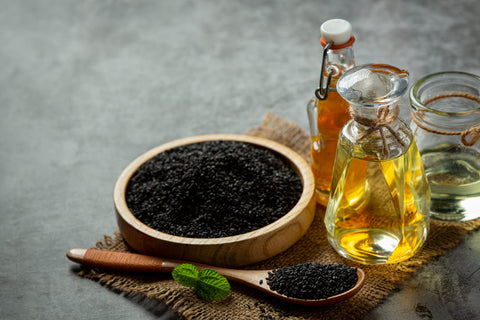Obesity, diabetes, depression, heart disease and irritable bowel syndrome are but a handful of conditions that may be helped by rebalancing your gut flora. Over 30 different beneficial pharmacological actions of probiotics have been identified and hundreds of studies have demonstrated that probiotics can be helpful for over 170 ailments!
Symptoms indicating you're lacking healthy bacteria include gas, bloating, constipation, frequent nausea, headaches, and sugar cravings. Most people do not realise the importance of healthy gut bacteria in maintaining overall health, particularly your immune, digestive and nervous system function.

Immune Dysfunction
The most common sign that your gut flora may be adversely impacted is lowered immunity. Absence of healthy gut bacteria has also been linked with autoimmune disorders due to its ability to conceivably shift the balance toward disease in individuals genetically predisposed to autoimmune diseases.
Friendly bacteria train your immune system to distinguish between pathogens and non-harmful antigens, and to respond appropriately. This prevents your immune system from overreacting to non-harmful antigens, which is the genesis of allergies. Friendly bacteria also contribute to the development of antibodies, important to protect us against harmful antigens.
Digestive Problems
Microbiota can be disturbed with administration of antibiotics, or because of a poor diet. Once disturbed, pathogens take control, and produce abnormal changes leading to various digestive problems. Studies indicate that taking probiotics can help reduce digestive complaints like bloating, constipation, diarrhoea and help with various inflammatory bowel problems.
Nervous System, Brain and Mood
It is hard to believe that by increasing the number of Psychobiotics (probiotic bacteria positively influencing our nervous system and brain) in the gut, we can improve our mood, better handle stress, and even treat anxiety or depression. But an explosion of research into the amazing world of the gut-brain link provides overwhelming evidence that it is true.
These mood-modulating psychobiotics help improve mood, prevent and treat depression by reducing levels of stress and decreasing brain inflammation as both factors are known to contribute to poor mental health. Another and probably the main way they can promote good mood is through their ability to make various neurotransmitters including serotonin, gamma-aminobutyric acid (GABA), catecholamines, or acetylcholine. It is believed that when these hormones and neurotransmitters are produced by bacteria in the gut, they seem to stimulate certain cells found in the gut’s lining to release molecules that influence and benefit brain function and emotional health.
Although we still need to learn more about the mechanism behind the mood-modulating action of psychobiotics yet there is no doubt that their beneficial impact on the nervous system is a fact. For example, both Bifidobacterium longum and Bifidobacterium breve reduced anxiety-like behaviour and improved cognition in anxious mice (1,2). According to another trial, a probiotic containing Lactobacillus helveticus and Bifidobacterium longum, taken for 30 days, alleviated psychological distress, depression, and anxiety (3).
Serotonin and Dopamine
As I have already mentioned, psychobiotics can improve mood through many ways. One of them is boosting levels of the most important good mood hormones and neurotransmitters. The best example could be a study which claims that Lactobacillus plantarum strain increased dopamine and serotonin, reducing depression-like behaviours in mice (4). The same psychobiotic was also able to balance cortisol and improve the stress response system (5).
GABA
There are over two dozen probiotic strains that produce GABA. The most effective seem to be some specific strains of Lactobacillus (6) (especially L. rhamnosus and L. brevis included, for instance, in MoodProbio) and Bifidobacterium (such as B. dentium) (7).
According to the results of a 2011 study administration of Lactobacillus rhamnosus to mice for 4 weeks, improves GABA concentrations in specific brain regions, followed by reductions in anxiety and depression-related behaviours.
How Psychobiotics Increase Good Mood Hormones Such as GABA
Our gut is our second brain, as it originates from the same type of tissue as your brain! These two systems are connected via the tenth cranial nerve - vagus nerve and, hence they work in tandem; each one is influencing the other.
The researchers who conducted that study argue that the increase in GABA levels in the brain was achieved through the vagus nerve because when this nerve was surgically removed the effect vanished. This conclusion is another proof of the gut-brain link and that certain GABA-manufacturing probiotic bacterial strains somehow manage to transfer this precious neurotransmitter to the brain via the vagus nerve!!! It is thought that when neurotransmitters are made by probiotics in the gut, these neurotransmitters, such as GABA or Serotonin, may trigger cells found in the gut’s lining to release certain molecules that send signals to the brain, thus affecting its function and emotions.
Although not all studies seem to confirm it, yet this idea seems to be very reasonable and most likely also due to other more recent scientific data.
In 2015 researchers fed mice with 1 x 109 CFU of Lactobacillus rhamnosus per day for 4 weeks to examine the influence of this probiotic on brain levels of 12 different neurometabolites including GABA, glutathione, inositol, alanine, aspartate, glycine, taurine, creatine, choline, glutamate with glutamine, and N-acetyl aspartate. The levels were tested every week and detected by magnetic resonance spectroscopy (MRS).
And low and behold, according to the results, GABA was again significantly elevated (by 25%), although this improvement was only seen after 4 weeks. Delayed increase was also detected for glutamate (about 10%), which was still elevated 4 weeks after treatment had ceased. Levels of N-acetyl aspartate was raised by 37% at 2 weeks, but it persisted only to the end of treatment.
It is interesting that the delay in the effectiveness of this treatment was like that of antidepressant medication.
GABA: The Only Food for Some Probiotics
According to another new discovery it looks like some probiotic bacteria residing in the gut in order to grow require to be fed by certain neurotransmitters such as GABA molecules! For example, Prof Philip Strandwitz and his team at Northeastern University in Boston found out that they could only grow a species of recently discovered gut bacteria, called KLE1738, if they fed them with GABA molecules! Even more surprising was the discovery according to which nothing else made that bacteria multiply and grow, except GABA! (8).
The same scientists are currently studying other strains of probiotic bacteria that also consume and make GABA in order to find out their influence on GABA concentrations in the brain and behavioural changes in animals (9).
Probiotics and Stress
However, probiotics can positively influence our brain and nervous system also in other ways. A second way that psychobiotics seem to promote mental health is by helping us to balance cortisol levels and reduce the harmful effect of stress which is known to contribute to mood disorders and cognitive problems.
For instance, Lactobacillus helveticus was compared to the SSRI, citalopram, in rats with depression, anxiety, and cognitive dysfunction triggered by chronic stress. According to the study results, the probiotic worked better than citalopram in reducing symptoms of stress-induced depression, anxiety, and cognitive dysfunction. It worked by lowering cortisol and increasing serotonin and other good mood neurotransmitters in the brain (10).
The same Lactobacillus helveticus combined with Lactobacillus rhamnosus normalized anxiety-like behaviour, learning and memory impairments in rats (11).
Decrease Brain Inflammation
The third way certain good gut bacteria are believed to relax and calm the brain is through reducing levels of brain inflammation, now known to be one of the major underlying causes of depression and other mood and cognitive disorders. There are reasons to believe that this inflammation can stem from the gut.
According to a clinical study involving patients with major depressive disorder those who received probiotic supplements with Lactobacillus acidophilus, Lactobacillus casei, and Bifidobacterium bifidum (2 billion CFUs each) for eight weeks had not only significantly decreased signs of depression but also systemic inflammation, significantly reduced insulin levels and insulin resistance, and a significantly raised glutathione (body’s most important antioxidant) (12).
Prebiotics (Food for Probiotics) Seem to Work as Psychobiotics
It is even more surprising that certain Prebiotics that feed and promote health and growth of probiotic bacteria can also impose a calming influence on our nervous system, mood and brain function.
According to one of the recent studies, participants received either Fructooligosaccharides (FOS) or Bimuno-galactooligosaccharides (B-GOS) every day for three weeks. The morning cortisol levels were significantly lower as a result of ingesting B-GOS compared with placebo. It reduced stress hormone, cortisol, anxiety, and improved attention and emotional health. No effects were found after the administration of FOS (13).
Another study found that the same prebiotic (Galactooligosaccharides) used for four weeks benefited anxiety in people with irritable bowel syndrome (IBS) (14).
Probiotic Supplements
The best psychobiotic supplements seem to be the ones that contain most of the mentioned above probiotic strains:
- Bifidobacterium longum
- Bifidobacterium dentium
- Bifidobacterium breve
- Bifidobacterium infantis
- Bifidobacterium bifidum
- Lactobacillus plantarum
- Lactobacillus helveticus
- Lactobacillus rhamnosus
- Lactobacillus acidophilus
- Lactobacillus casei
- Lactobacillus brevis
- Lactobacillus salivarius
Make sure they come from a reliable supplier who offers live and resistant to stomach acid and bile strains. Unfortunately, when some time ago scientists in America decided to test the most popular probiotic supplements, they found out that 70% of them contained inactive bacteria!
Probiotics should also be combined with prebiotics such as GOS or FOS. Some super foods such as especially Chlorella are also excellent food for probiotics.
Dosage
As far as the optimal dosage is concerned, it has yet to be determined, but generally, at least 10 billion CFU’s (Colony Forming Units) per day are recommended.
Taking into consideration various studies you also need to be patient, as the improvement and first positive results may appear after at least few weeks or longer.
Finally, please keep in mind that deficiency of good bacteria in the gut is only one aspect of mental health. There are many different causes of poor mental health, depression, anxiety, nervousness, and inability to control stress.
Related Articles
- How to Improve Mood and Emotional Health | HealthAid
- What Is Stress And How To Cope With It | HealthAid
References
- Bifidobacteria exert strain-specific effects on stress-related behavior and physiology in BALB/c mice - PubMed (nih.gov)
- Bifidobacteria modulate cognitive processes in an anxious mouse strain - PubMed (nih.gov)
- Assessment of psychotropic-like properties of a probiotic formulation (Lactobacillus helveticus R0052 and Bifidobacterium longum R0175) in rats and human subjects - PubMed (nih.gov)
- Alteration of behavior and monoamine levels attributable to Lactobacillus plantarum PS128 in germ-free mice - PubMed (nih.gov)
- Psychotropic effects of Lactobacillus plantarum PS128 in early life-stressed and naïve adult mice - PubMed (nih.gov)
- Production of gaba (γ – Aminobutyric acid) by microorganisms: a review - PMC (nih.gov)
- γ-Aminobutyric acid production by culturable bacteria from the human intestine - PubMed (nih.gov)
- Is GABA a link between gut and brain? - Mapping Ignorance
- GABA (Gamma-aminobutyric Aacid) – FULL HEALTH SECRETS
- Administration of Lactobacillus helveticus NS8 improves behavioral, cognitive, and biochemical aberrations caused by chronic restraint stress - PubMed (nih.gov)
- Probiotics normalize the gut-brain-microbiota axis in immunodeficient mice - PMC (nih.gov)
- Clinical and metabolic response to probiotic administration in patients with major depressive disorder: A randomized, double-blind, placebo-controlled trial - ScienceDirect
- Prebiotic intake reduces the waking cortisol response and alters emotional bias in healthy volunteers - PMC (nih.gov)
- Clinical trial: the effects of a trans‐galactooligosaccharide prebiotic on faecal microbiota and symptoms in irritable bowel syndrome - SILK - 2009 - Alimentary Pharmacology & Therapeutics - Wiley Online Library
Sources
- Bravo JA, Forsythe P, Chew MV, Escaravage E, Savignac HM, Dinan TG., …Cryan, J.F (2011) Ingestion of Lactobacillus strain regulates emotional behavior and central GABA receptor expression in a mouse via the vagus nerve. Proc Natl Acad Sci 108 (38): 16050–16055.
- Janik R, Thomason LA, Stanisz AM, Forsythe P, Bienenstock J, Stanisz GJ (2016) Magnetic resonance spectroscopy reveals oral Lactobacillus promotion of increases in brain GABA, N-acetyl aspartate, and glutamate. Neuroimage 125: 988-995. doi: 10.1016/j.neuroimage.2015.11.018
- Coghlan, A (2016) Gut bacteria spotted eating brain chemicals for the first time. New Scientist July 1.
- https://mappingignorance.org/2016/08/04/gaba-link-gut-brain/
- Biol Psychiatry. 2013 Nov 15;74(10):720-6.
- Gastroenterology. 2013 Jun;144(7):1394-401, 1401.e1-4.
- Adv Exp Med Biol. 2014;817:221-39.
- Neurogastroenterol Motil. 2014 Apr;26(4):510-20.
- Psychiatry. 2006 May;5(5):166–170.
- Clin Ther. 2015 May 1;37(5):984-95.
- Nutrition. 2015 Sep 28. pii: S0899-9007(15)00391-3.
- Br J Nutr. 2011 Mar;105(5):755-64.
- Gut Pathog. 2009 Mar 19;1(1):6.
- Behav Brain Res. 2016 Feb 1;298(Pt B):202-9.
- Brain Res. 2015 Nov 24. pii: S0006-8993(15)00862-8.
- Neurogastroenterol Motil. 2014 Nov;26(11):1615-27.
- Behav Brain Res. 2015;287:59-72.
- Benef Microbes. 2015 Dec 21:1-12.
- Neuroscience. 2015 Dec 3;310:561-77.
- Psychoneuroendocrinology. 2013 Sep;38(9):1738-47.
- Am J Physiol Gastrointest Liver Physiol. 2014 Oct 15; 307(8): G793–G802.
- Psychopharmacology (Berl). 2015; 232(10): 1793–1801.
- Neuropsychiatr Dis Treat. 2015; 11: 715–723.
- Aliment Pharmacol Ther. 2009 Mar 1;29(5):508-18.
Any information or product suggested on this website is not intended to diagnose, treat, cure or prevent any medical condition. Never disregard medical advice or delay in seeking it because of something you have read on this website. Consult your primary healthcare physician before using any supplements or making any changes to your regime.





